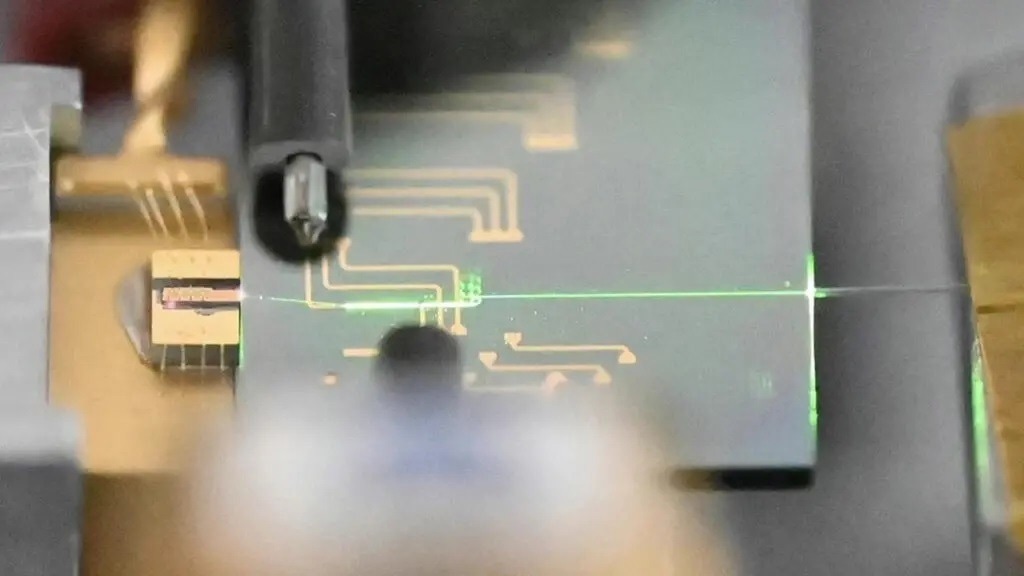
Chip scale, ultrafast mode-locked laser based on nanophotonic lithium niobate. Image Credit: Alireza Marandi
Scientist Qiushi Guo validated a new approach for creating high-performance ultrafast lasers on nanophotonic chips. The research is published as the cover story in the journal Science. His research is based on miniaturizing mode-lock lasers. They are unique laser that emits a train of ultrashort, coherent light pulses in femtosecond intervals, which is an astonishing quadrillionth of a second.
Ultrafast mode-locked lasers play a crucial role in unraveling the mysteries of the fastest timescales in nature, such as the formation or disruption of molecular bonds in chemical reactions and the dynamics of light propagation in turbulent mediums.
The rapid pulse-peak intensity and extensive spectrum coverage of mode-locked lasers have facilitated various photonics technologies, including optical atomic clocks, biological imaging, and light-based data computation in computers.
Regrettably, contemporary state-of-the-art mode-locked lasers are both costly and power-intensive tabletop systems, restricting their usage primarily to laboratory settings.
Our goal is to revolutionize the field of ultrafast photonics by transforming large lab-based systems into chip-sized ones that can be mass-produced and field deployed. Not only do we want to make things smaller, but we also want to ensure that these ultrafast chip-sized lasers deliver satisfactory performances. For example, we need enough pulse-peak intensity, preferably over 1 Watt, to create meaningful chip-scale systems.
Qiushi Guo, Professor, Physics, CUNY Graduate Center
Qiushi Guo is also a faculty member of CUNY Advance Science Research Center’s Photonics Initiative.
Creating a successful mode-locked laser integrated into a chip poses inherent challenges. Guo's research capitalizes on the potential of an emerging material platform called thin-film lithium niobate (TFLN).
This material facilitates highly efficient shaping and precise control of laser pulses through the application of an external radio frequency electrical signal. In their experiments, Guo's team ingeniously merged the high laser gain characteristics of III-V semiconductors with the efficient pulse-shaping capabilities of TFLN nanoscale photonic waveguides. The outcome was a laser with the capacity to emit a remarkable output peak power of 0.5 Watts.
In addition to its compact size, the showcased mode-locked laser showcases a range of intriguing properties that surpass those achievable by conventional counterparts, holding significant promise for future applications.
For instance, through the precise adjustment of the laser's pump current, Guo achieved the ability to finely tune the repetition frequencies of output pulses across an extensive range of 200 MHz. Leveraging the robust reconfigurability of this demonstrated laser, the research team aspires to facilitate chip-scale, frequency-stabilized comb sources crucial for precision sensing applications.
While the realization of scalable, integrated, ultrafast photonic systems suitable for portable and handheld devices poses additional challenges for Guo's team, the current demonstration marks a significant milestone in overcoming a major obstacle.
This achievement paves the way for eventually using cell phones to diagnose eye diseases or analyze food and environments for things like E. coli and dangerous viruses. It could also enable futuristic chip-scale atomic clocks, which allows navigation when GPS is compromised or unavailable.
Qiushi Guo, Professor, Physics, CUNY Graduate Center
Journal Reference
Guo, Q., et al. (2023). Ultrafast mode-locked laser in nanophotonic lithium niobate. Science. doi/10.1126/science.adj5438.